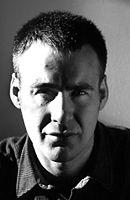Revenge of the Battery Hen or...If poetry is a magic trick on the page what does poet David Alexander conjure for the mother hen in all of us?
If you've seen the recent McDonald's commercials (er at least ad vertz in the UK) you'll know that big business will go far to ensure the chicken on your plate is either Kosher, Halal, hand reared or otherwise plucked and de-clucked with kindness. Whether or not you believe this to be true is another thing and David Alexander's book of poetry, After the Hatching Oven, Nightwood Editions (2018) debunks a few of these myths and puts the pathos of henny penny back in favour of the persecuted pullet.
For those working at the Egg Boards of Canada Pluckers, how many may recall
a shadowy janitorial figure with a late night case of the munchies, ambling into a 'bright, tiled place, (who) chewed through spicy tendons and
veins and dropped bones onto the rain kissed sidewalk'? How would the tragic end of a cybernetic fowl register with a child who watches with interest a beak peck through a brown egg in a primary school incubator? If poetry is a magic trick on the page, what does the poet David Alexander conjure for the Mother Hen in all of us?
Alexander is philosophical the plight of the innocent fowl and considers a chicken who may have 'rebel'led and perhaps fomed a 'language for revolution'. That is not to say this is a glib critique of the consumer society, although it is certainly a celebration of the place in history of the beloved farm yard hen. Many of the poems in the collection pay tribute to pheasant's domesticated cousin, gallus gallus, through literary forbears, or friends: H.G. Wells, Bp nichol, Ted Hughes, Dani Couture, Elizabeth Bishop, Kate Sutherland; those familiar with allegorical tales may delight in nods to Animal Farm or tales from Brother's Grimm. The art of the poems is to put the lens on the hen from different vantage points: public health advisories, recipes, parables, terrorism acts. Crossing time zones and states of mind each poem is an individuated, self contained-riff on how we got to cram all those birds in small heated spaces and forgot our own modest beginnings in the doing. From a Review of the London Poultry House, an online course on chicken behaviour and welfare, the recurring theme is our little red hen friend, and their quiet existence in our lives under duress. In Elegy a rooster crows 'who was she, was she yours?'
If you have even lived on a farm you know the cluck of a contented chicken like the purr of a contented cat. You may also know about the weird sense of itchiness that comes when you visit a chicken battery, an "Auschwitz for hens" a Jewish family friend once remarked. Is this the subversive protest of a friend left behind?
The sensitivity for the beloved bird which has been subsumed in Knorr Cubes and deep fried wings is relayed as if slogans or calls to arms, pasted on a Town Hall wall. It is as if these carefully chosen pastiches of separate comic, existential or biblical poems is addressing a separate audience but asking the same question: would chickens be as kind to us if the roles were switched? If chickens were as big as a Tyranasaurus Rex, if they could spread an avian flue epidemic, if they could show love to us, would they? Or is the yolk really on us? Idiomatically, chickens as a subject, can't be topped surely? After all, you don't have to be a good egg, to know this is chicken soup for the soul, no? But is this book of poetry a simple run of cliches on our feathered friend?
No. This is a late night behind the barn with two people who are going to duke it out for the rest of the village because there is no better way to express the rage of oppression. This is the pamphlet that lies in the corner, the newspaper, the spitoon bucket, each sheet of paper a leaf of anti-hen slavery rhetoric.
This is a warning to multinationals and those persons seeking to exist on fast food. What goes around, flies right back in your face and conscience. Is it really better to persecute or beloved bird and claim ignorance and run afowl of our own conscience? After all when we drive through the KFC, isn't it better to ask how we got to this point or, seeking to bury our heads in modern convenience do we even know that if we are not careful about how we look at familiar things – surely for the benefit of our own souls – our own goose may be cooked, our own chickens may come home to roost as well?
Labels: Battery Hen, David Alexander, KFC, Nightwood Editions, Parody, Poetry


0 Comments:
Post a Comment
<< Home